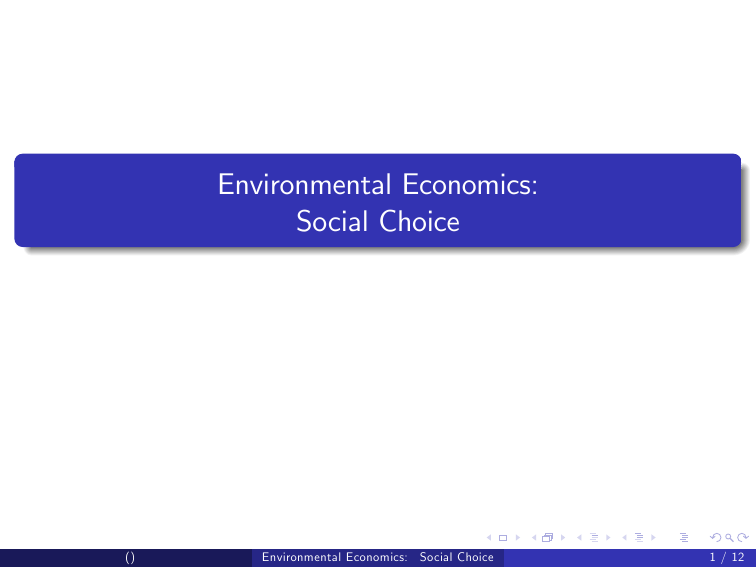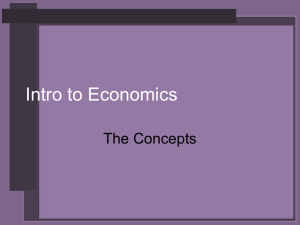Social Choice
advertisement

Environmental Economics: Social Choice () Environmental Economics: Social Choice 1 / 12 Social choice Environmental economists start by taking as given individual preferences and ask how social or group decisions can be made. How do individuals view the environment? How do we aggregate all the individual opinions to create an opinion for society as a whole? () Environmental Economics: Social Choice 2 / 12 Individual attitudes towards the environment Biocentrism: all living things have intrinsic value, regardless of their instrumental value (usefulness) Anthropocentrism: only value of environment is its intrumental value to humans Utilitarianism: well-being that people attain from the environment, whether instrumental, spiritual, intrinsic Precautionary principle: future is uncertain; therefore take actions that minimize potential losses Sustainability: development that meets the needs of the present generation without compromising the ability of future generations to meet their own needs () Environmental Economics: Social Choice 3 / 12 Social choice from individual values Utility function: no restriction on individual preferences One approach to model individual utilities: Utility of individual i : Ui (xi , e ) xi composite market good e environmental quality Di¤erent individuals consume di¤erent amounts of the composite market good, but the same amount of environmental quality () Environmental Economics: Social Choice 4 / 12 Pollution damages in utility terms (McKitrick, 2011) Consumer’s preferences are represented by a utility function U (x, e ) where x is a vector of consumption goods and e is the level of emissions Consumer faces a price vector p for x, and has income M. Solving the utility maximization problem yields continuous demand functions x (p, e, m ) Denote by u0 the household’s optimized utility in the absence of any pollution () Environmental Economics: Social Choice 5 / 12 Denote the household’s expenditure function as m (p, e, U ) = h, showing the minimum amount h the household must spend to achieve utility U, given prices p and pollution level e. The Total Damages function TD is de…ned by m (p, e, u0 ) = m (p, 0, u0 ) + TD (p, e ) TD is the amount the household would need to receive to be as well o¤ in the presence of pollution (assuming optimal choices on x) as it would have been in the absence of pollution. Marginal damage: MD (p, e, u0 ) = TDe = me MD is continuous with respect to e, by construction () Environmental Economics: Social Choice 6 / 12 Sample Question Suppose a utility function is given by β U (x1 , x2 , e ) = x1α x2 e2 where x1 and x2 are consumer goods with corresponding prices p1 , p2 , α + β =1 and e is pollution emissions. Total income is denoted M. Derive the Total and Marginal Damage functions. () Environmental Economics: Social Choice 7 / 12 Social choice from individual values Voting as a social choice mechanism Unanimity/Pareto criterion hard to fault but not possible to compare all bundles Unanimity with accompanying side payments possible to compare more bundles than Pareto criterion, but transfers may not be possible/desirable in reality Hicks (1940): if transfers could be made to acheive unanimity, then the choice is socially desirable even if no transfer is actually made (equity versus e¢ ciency debate) Majority rule possible to compare all bundles but does not take into account intensities of preferences () Environmental Economics: Social Choice 8 / 12 Social Welfare Function Let W be a function that associates a single number with every distribution of utilities in society: W (U1 , ..., UN ) If W (U1 (a) , ..., UN (a)) > W (U1 (b ) , ..., UN (b )) then a is the socially preferred bundle over b. Examples: 0 Benthamite: W (U1 , ..., UN ) = ∑i θ i Ui . θ i Egalitarian: W (U1 , ..., UN ) = ∑i Ui λ ∑i [Ui min (Ui )] Rawlsian: W (U1 , ..., UN ) = min (Ui ) () Environmental Economics: Social Choice 9 / 12 Arrow’s Impossibility Theorem There is no rule satisfying all of the following axioms for converting individual preferences into a social preference ordering. Completeness: we should be able to compare all social alternatives Unanimity: If everyone in society prefers a to b, then society as a whole should also prefer a to b. Nondictatorship: No individual should always get their way Universality: Any possible individual rankings of alternatives is permissible Transitivity: If a is socially preferred to b and b to c, then a should be socially preferred to c. Independence of irrelevant alternatives: Society’s choice between a and b should only depend on how individuals rank a and b, without regard to other alternatives () Environmental Economics: Social Choice 10 / 12 Criticism of Utilitarian Perspective Utility functions may change over time (advertising, education) Not everyone is included in voting Should policies be based on individual preferences? () Environmental Economics: Social Choice 11 / 12 Mandatory Readings Chapter 3, Kolstad Chapter 2, McKitrick () Environmental Economics: Social Choice 12 / 12
